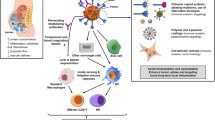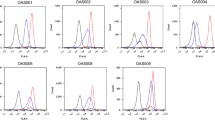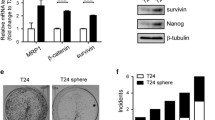Abstract
Objective
Ten patients with recurrent ovarian cancer received a combined treatment of optimal tumor debulking, adenovirus-mediated herpes simplex virus thymidine kinase gene therapy (GT), and systemic application of acyclovir or valacyclovir and topotecan. Biopsies were taken at the time of secondary debulking about 1 month after the application of GT and chemotherapy and were analyzed for expression of coxsackie-adenovirus receptor (CAR) and integrins αvβ3 and αvβ5 with respect to treatment response.
Methods
Treatment modalities and study design have been described recently. Immunohistochemistry was used to visualize expression of CAR and integrins αvβ3 and αvβ5 in tumor samples taken before and after application of GT.
Results
Before GT six of ten patients presented with CAR-positive and four with CAR-negative tumors. After GT all tumors showed CAR expression. Integrin αvβ3 was found in all tumors before and after GT. Expression of integrin αvβ5 was seen in eight of ten tumor samples before GT and in all samples after GT.
Conclusion
Despite the importance of CAR and integrin expression for successful adenovirus internalization, other cell surface receptors might be involved in this process. It is too early to decide whether expressions of CAR and integrin αvβ3/αvβ5 on tumor cells are appropriate additional inclusion criteria for the enrollment of patients in GT trials. Further research is necessary to evaluate the effect of GT plus chemotherapy on CAR and integrin expression.
Similar content being viewed by others
References
Greenlee RT, Murray T, Bolden S, Wingo PA. Cancer statistics, 2000. CA Cancer J Clin 2000;50:7–33.
Auersperg N, Wong AS, Choi KC, Kang SK, Leung PC. Ovarian surface epithelium: Biology, endocrinology, and pathology. Endocr Rev 2001;22:255–88.
Gershenson DM. Advances in the management of early-stage epithelial ovarian cancer. In: Perry MC, ed. American Society of Clinical Oncology Educational Book. San Francisco: ASCO, 2001:462–7.
Gore M. Treatment of relapsed epithelial ovarian cancer. In: Perry MC, ed. American Society of Clinical Oncology Educational Book. San Francisco: ASCO, 2001:468–76.
Knopf K, Brown M, Kohn EC. Lack of improvement in survival in patients with relapsed or refractory epithelial ovarian cancer 1980–1997. Proc Am Soc Oncol 1998;17:359a.
Robertson MW 3rd, Barnes MN, Rancourt C, et al. Gene therapy for ovarian carcinoma. Semin Oncol 1998;25:397–406.
Yang Y, Nunes FA, Berencsi K, Furth EE, Gonczol E, Wilson JM. Cellular immunity to viral antigens limits E1-deleted adenoviruses for gene therapy. Proc Natl Acad Sci U S A 1994;91: 4407–11.
Kay MA, Holterman AX, Meuse L, et al. Long-term hepatic adenovirus-mediated gene expression in mice following CTLA4Ig administration. Nat Genet 1995;11:191–7.
Yang Y, Li Q, Ertl HC, Wilson JM. Cellular and humoral immune responses to viral antigens create barriers to lung-directed gene therapy with recombinant adenoviruses. J Virol 1995;69:2004–15.
Kovesdi I, Brough DE, Bruder JT, Wickham TJ. Adenoviral vectors for gene transfer. Curr Opin Biotechnol 1997;8:583–9.
Verma IM, Somia N. Gene therapy—promises, problems and prospects. Nature 1997;389:239–42.
Vile RG, Russell SJ, Lemoine NR. Cancer gene therapy: Hard lessons and new courses. Gene Ther 2000;7:2–8.
Bilbao G, Gomez-Navarro J, Curiel DT. Targeted adenoviral vectors for cancer gene therapy. Adv Exp Med Biol 1998;451: 365–74.
Brody SL, Jaffe HA, Han SK, Wersto RP, Crystal RG. Direct in vivo gene transfer and expression in malignant cells using adenovirus vectors. Hum Gene Ther 1994;5:437–47.
Walther W, Stein U. Viral vectors for gene transfer: A review of their use in the treatment of human diseases. Drugs 2000;60:249–71.
Bi WL, Parysek LM, Warnick R, Stambrook PJ. In vitro evidence that metabolic cooperation is responsible for the bystander effect observed with HSV-TK retroviral gene therapy. Hum Gene Ther 1993;4:725–31.
Freeman SM, Abboud CN, Whartenby KA, et al. The “bystander effect”: Tumor regression when a fraction of the tumor mass is genetically modified. Cancer Res 1993;53:5274–83.
Tong XW, Block A, Chen SH, Woo SLC, Kieback DG. Adenovirus-mediated thymidine kinase gene transduction in human epithelial ovarian cancer cell lines followed by exposure to ganciclovir. Anticancer Res 1996;16:1611–8.
Elshami AA, Cook JW, Amin KM, et al. The effect of promoter strength in adenoviral vectors containing herpes simplex virus thymidine kinase on cancer gene therapy in vitro and in vivo. Cancer Gene Ther 1997;4:213–21.
Bouvet M, Ellis LM, Nishizaki M, et al. Adenovirus-mediated wild-type p53 gene transfer down-regulates vascular endothelial growth factor expression and inhibits angiogenesis in human colon cancer. Cancer Res 1998;58:2288–92.
Frank DK, Frederick MJ, Liu TJ, Clayman GL. Bystander effect in the adenovirus-mediated wild-type p53 gene therapy model of human squamous cell carcinoma of the head and neck. Clin Cancer Res 1998;4:2521–8.
Rizk NP, Chang MY, El Kouri C, et al. The evaluation of adenoviral p53-mediated bystander effect in gene therapy of cancer. Cancer Gene Ther 1999;6:291–301.
Rosenfeld ME, Feng M, Michael SI, Siegal GP, Alvarez RD, Curiel DT. Adenoviral-mediated delivery of the herpes simplex virus thymidine kinase gene selectively sensitizes human ovarian carcinoma cells to ganciclovir. Clin Cancer Res 1995;1:1571–80.
Smythe WR, Hwang HC, Elshami AA, Amin KM, Albelda SM, Kaiser LR. Differential sensitivity of thoracic malignant tumors to adenovirus-mediated drug sensitization gene therapy. J Thorac Cardiovasc Surg 1995;109:626–30; discussion 630–1.
Behbakht K, Benjamin I, Chiu HC, et al. Adenovirus-mediated gene therapy of ovarian cancer in a mouse model. Am J Obstet Gynecol 1996;175:1260–5.
Tong X, Engehausen DG, Freund CT, et al. The efficacy of adenovirus-mediated gene therapy of ovarian cancer is enhanced by using the cytomegalovirus promoter. Anticancer Res 1998; 18:719–25.
Mujoo K, Maneval DC, Anderson SC, Gutterman JU. Adenoviral-mediated p53 tumor suppressor gene therapy of human ovarian carcinoma. Oncogene 1996;12:1617–23.
Yee D, McGuire SE, Brünner N, et al. Adenovirus-mediated gene transfer of herpes simplex virus thymidine kinase in an ascites model of human breast cancer. Hum Gene Ther 1996;7: 1251–7.
Varga MJ, Weibull C, Everitt E. Infectious entry pathway of adenovirus type 2. J Virol 1991;65:6061–70.
Belin MM, Boulanger P. Involvement of cellular adhesion sequences in the attachment of adenovirus to the HeLa cell surface. J Gen Virol 1993;74:1485–97.
Wickham TJ, Mathias P, Cheresh DA, Nemerow GR. Integrins alpha v beta 3 and alpha v beta 5 promote adenovirus internalization but not virus attachment. Cell 1993;73:309–19.
Hong SS, Karayan L, Tournier J, Curiel DT, Boulanger PA. Adenovirus type 5 fiber knob binds to MHC class I alpha2 domain at the surface of human epithelial and B lymphoblastoid cells. EMBO J 1997;16:2294–306.
Bergelson JM, Cunningham JA, Droguett G, et al. Isolation of a common receptor for Coxsackie B viruses and adenoviruses 2 and 5. Science 1997;275:1320–3.
Tomko RP, Xu R, Philipson L. HCAR and MCAR: The human and mouse cellular receptors for subgroup C adenoviruses and group B coxsackieviruses. Proc Natl Acad Sci U S A 1997; 94:3352–6.
Fechner H, Haack A, Wang H, et al. Expression of Coxsackie adenovirus receptor and alpha-integrin does not correlate with adenovector targeting in vivo indicating anatomical vector barriers. Gene Ther 1999;6:1520–35.
You Z, Fischer DC, Tong XW, Hasenburg A, Aguilar-Cordova E, Kieback DG. Coxsackievirus-adenovirus receptor (CAR) expression in ovarian cancer cell lines is associated with increased transduction efficiency and transgene expression. Cancer Gene Ther 2001;8:168–75.
Hasenburg A, Tong XW, Rojas-Martinez A, et al. Thymidine kinase gene therapy with concomitant topotecan chemotherapy for recurrent ovarian cancer. Cancer Gene Ther 2000;7:839–52.
Kudelka AP, Tresukosol D, Edwards CL, et al. Phase II study of intravenous Topotecan as a 5-day infusion for refractory epithelial ovarian carcinoma. J Clin Oncol 1996;14:1552–7.
Bookman MA, Malmström H, Bolis G, et al. Topotecan for the treatment of advanced epithelial ovarian cancer: An open-label phase II study in patients treated after prior chemotherapy that contained cisplatin or carboplatin and paclitaxel. J Clin Oncol 1998;16:3345–52.
Hochster H, Wadler S, Runowicz C, et al. Activity and pharmacodynamics of 21-day topotecan infusion in patients with ovarian cancer previously treated with platinum-based chemotherapy. J Clin Oncol 1999;17:2553–61.
Bokkel Huinink W, Gore M, Carmichael J, et al. Topotecan versus Paclitaxel for the treatment of recurrent epithelial ovarian cancer. J Clin Oncol 1997;15:2183–93.
Shi SR, Key ME, Kalra KL. Antigen retrieval in formalin-fixed, paraffin-embedded tissues: An enhancement method for immunohistochemical staining based on microwave oven heating of tissue sections. J Histochem Cytochem 1991;39:741–8.
Ram Z, Culver KW, Walbridge S, Blaese M, Oldfield EH. In situ retroviral-mediated gene transfer for the treatment of brain tumors in rats. Cancer Res 1993;53:83–8.
Chen SH, Shine HD, Goodman JC, Grossman RG, Woo SL. Gene therapy for brain tumors: Regression of experimental gliomas by adenovirus-mediated gene transfer in vivo. Proc Natl Acad Sci U S A 1994;91:3054–7.
Sewell DA, Li D, Duan L, Westra WH, O’Malley BW Jr. Safety of in vivo adenovirus-mediated thymidine kinase treatment of oral cancer. Arch Otolaryngol Head Neck Surg 1997:1298–302.
O’Malley BWJ, Chen SH, Schwartz MR, Woo SLC. Adenovirus-mediated gene therapy for human head and neck squamous cell cancer in a nude mouse model. Cancer Res 1995;55:1080–5.
Perez-Cruet MJ, Trask TW, Chen SH, et al. Adenovirus-mediated gene therapy of experimental gliomas. J Neurosci Res 1994; 39:506–11.
Freeman SM, Mc Cune C, Robinson W, et al. The treatment of ovarian cancer with a gene modified cancer vaccine: A phase I study. Hum Gene Ther 1995;6:927–39.
Alvarez RD, Curiel DT. A phase I study of recombinant adenovirus vector-mediated intraperitoneal delivery of herpes simplex virus thymidine kinase (HSV-TK) gene and intravenous ganciclovir for previously treated ovarian and extraovarian cancer patients. Hum Gene Ther 1997;8:597–613.
Alvarez RD, Gomez-Navarro J, Wang M, et al. Adenoviral-mediated suicide gene therapy for ovarian cancer. Mol Ther 2000;2:524–30.
Tong XW, Shine DH, Agoulnik I, et al. Adenovirus mediated thymidine kinase gene therapy may enhance sensitivity of ovarian cancer cells to selected chemotherapeutic agents. Anticancer Res 1998;18:3421–6.
Li Y, Pong RC, Bergelson JM, et al. Loss of adenoviral receptor expression in human bladder cancer cells: A potential impact on the efficacy of gene therapy. Cancer Res 1999;59:325–30.
Tong XW, Agoulnik I, Contant CF, et al. Human epithelial ovarian cancer xenotransplants into nude mice can be cured by adenovirus-mediated thymidine kinase gene therapy. Anticancer Res 1997;17:811–4.
Crystal RG, McElvaney NG, Rosenfeld MA, et al. Administration of an adenovirus containing the human CFTR cDNA to the respiratory tract of individuals with cystic fibrosis. Nat Genet 1994;8:42–51.
Sawchuk SJ, Boivin GP, Duwel LE, et al. Anti-T cell receptor monoclonal antibody prolongs transgene expression following adenovirus-mediated in vivo gene transfer to mouse synovium. Hum Gene Ther 1996;7:499–506.
Worgall S, Wolff G, Falck-Pedersen E, Crystal RG. Innate immune mechanisms dominate elimination of adenoviral vectors following in vivo administration. Hum Gene Ther 1997;8:37–44.
Kolls JK, Lei D, Odom G, et al. Use of transient CD4 lymphocyte depletion to prolong transgene expression of E1-deleted adenoviral vectors. Hum Gene Ther 1996;7:489–97.
DeMatteo RP, Markmann JF, Kozarsky KF, Barker CF, Raper SE. Prolongation of adenoviral transgene expression in mouse liver by T lymphocyte subset depletion. Gene Ther 1996;3:4–12.
Albelda SM. Clinical use of adenovirally delivered herpes simplex virus thymidine kinase (HSVtk) to treat localized malignancies. Cancer Gene Ther 1999;6:19(Abstract).
Zhang J, Russell SJ. Vectors for cancer gene therapy. Cancer Metastasis Rev 1996;15:385–401.
Liu PC, Benjamin I, Morgan MA, King SA, Mikuta JJ, Rubin SO. Effect of surgical debulking on survival in stage IV ovarian cancer. Gynecol Oncol 1997;64:4–8.
Curtin JP, Malik R, Venkatraman ES, Barakat RR, Hoskins WJ. Stage IV ovarian cancer: Impact of surgical debulking. Gynecol Oncol 1997;64:9–12.
Melcher AA, Garcia-Ribas I, Vile RG. Gene therapy for cancer—managing expectations. BMJ 1997;315:1604–7.
Munkarah AR, Hallum AV, Morris M, et al. Prognostic significance of residual disease in patients with stage IV epithelial ovarian cancer. Gynecol Oncol 1997;64:13–7.
Chi DS, Liao JB, Leon LF, et al. Identification of prognostic factors in advanced epithelial ovarian carcinoma. Gynecol Oncol 2001;82:532–7.
Dechecchi MC, Melotti P, Bonizzato A, Santacatterina M, Chilosi M, Cabrini G. Heparan sulfate glycosaminoglycans are receptors sufficient to mediate the initial binding of adenovirus types 2 and 5. J Virol 2001;75:8772–80.
Runnebaum IB, Buller R, Peagram M, Salko T, Rybak ME, Horowitz J. Phase I/II gene therapy in recurrent ovarian cancer with intraperitoneal recombinant adenoviral human p53. J Cancer Res Clin Oncol 2000;126(Suppl):R43.
Author information
Authors and Affiliations
Corresponding author
Additional information
A. Hasenburg and D.-C. Fischer contributed equally to this study.
This study was supported by a generous grant from Methodist Hospital, Houston, Texas; GlaxoSmithKline, Philadelphia, Pennsylvania; Advantagene Inc., San Diego, California; and by a grant from the Deutsche Forschungsgemeinschaft (DFG 726-1/1 Kie).
Rights and permissions
About this article
Cite this article
Hasenburg, A., Fischer, DC., Tong, XW. et al. Adenovirus-Mediated Thymidine Kinase Gene Therapy for Recurrent Ovarian Cancer: Expression of Coxsackie-Adenovirus Receptor and Integrins αvβ3 and αvβ5. Reprod. Sci. 9, 174–180 (2002). https://doi.org/10.1177/107155760200900310
Published:
Issue Date:
DOI: https://doi.org/10.1177/107155760200900310




